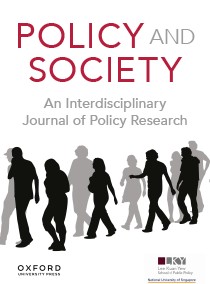Steering the future: expert knowledge and stakeholder voices in autonomous vehicle policy reports
IF 5.7
1区 社会学
Q1 POLITICAL SCIENCE
引用次数: 0
Abstract
The anticipated arrival of autonomous vehicles has created considerable uncertainty for US states because they govern roads. In response, states activated their policy advisory systems. While policy advising at the national level has been studied, less is known about the sub-national level. Similarly, more is known about the use of scientific knowledge by policymakers than about the full range of knowledge deployed in policy advising. This study analyzes reports written for states to help them make sense of an emerging technology in preparation for governance. Committees, university researchers, staff at Department of Transportation, and legislative staff produced different types of reports, for example, more and less academic, focused more or less on topics associated with governance or engineering. Our analysis reveals that state policy advisory systems used two types of processes—convening and expert—and employed three types of expertise—academic, practical, and political—to help prepare to govern this emerging technology. The study provides insight into how states mobilized expertise to address uncertainty around an emerging technology, showing how different actors balanced the need for credible technical knowledge with legitimate stakeholder engagement.引导未来:自动驾驶汽车政策报告中的专家知识和利益相关者的声音
自动驾驶汽车的到来给美国各州带来了相当大的不确定性,因为它们管理着道路。作为回应,各州启动了他们的政策咨询系统。虽然对国家层面的政策建议进行了研究,但对次国家层面的政策建议却知之甚少。同样,人们对决策者使用科学知识的了解比对政策咨询中部署的全部知识的了解要多。本研究分析了为各州撰写的报告,以帮助他们理解新兴技术,为治理做准备。委员会、大学研究人员、交通部的工作人员和立法人员制作了不同类型的报告,例如,或多或少的学术性报告,或多或少地关注与治理或工程相关的主题。我们的分析表明,国家政策咨询系统使用了两种类型的流程——召集和专家——并采用了三种类型的专业知识——学术、实践和政治——来帮助准备管理这一新兴技术。该研究深入了解了各国如何动员专业知识来解决新兴技术的不确定性,展示了不同的参与者如何平衡对可靠技术知识的需求与合法的利益相关者参与。
本文章由计算机程序翻译,如有差异,请以英文原文为准。
求助全文
约1分钟内获得全文
求助全文
来源期刊

Policy and Society
Multiple-
CiteScore
18.00
自引率
6.50%
发文量
43
审稿时长
30 weeks
期刊介绍:
Policy and Society is a prominent international open-access journal publishing peer-reviewed research on critical issues in policy theory and practice across local, national, and international levels. The journal seeks to comprehend the origin, functioning, and implications of policies within broader political, social, and economic contexts. It publishes themed issues regularly and, starting in 2023, will also feature non-themed individual submissions.
 求助内容:
求助内容: 应助结果提醒方式:
应助结果提醒方式:


